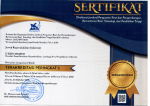PENYELENGGARAAN PROGRAM BINA KELUARGA LANSIA (BKL) DI WILAYAH PERKOTAAN: POTRET PERMASALAHAN KLASIK
Abstract
In 2045, population projection shows that one of five Indonesians is elderly. They are considered as a vulnerable group in terms of physical, economic, social-environmental and psychological challenges. Family plays a vital role in supporting an older person to overcome these challenges. Indonesia government has also developed a program to support the elderly population and their family through the initiation of Bina Keluarga Lansia (BKL) program. However, the implementation of this program is facing many obstacles at various levels. This paper aims to analyze the challenges that occur in the implementation of the BKL program, especially in urban areas. This paper based on the results of research conducted in Medan, Surabaya, and Mataram. Data and information gained through interviews, focus group discussion (FGD), observation, and literature review. The study found that the major problem of BKL is the lack of participation of the elderly group and their families due to various factors, particularly related to the format of the program’s activities. Integration of other aged person programs can be a solution to increase the involvement in the BKL program. Moreover, the strong commitment of the local government in improving the welfare of the elderly group is needed to support the program’s successfulness.
Keywords
Full Text:
PDFReferences
Aboderin, I. (2004). Modernisation and ageing theory revisited: Current explanations of recent developing world and historical Western shift in material family support for older people. Ageing and Society, 24(1), 29-50. https://doi.org/10.1017/S0144686X03001521
Afrizal. (2018). Permasalahan yang dialami lansia dalam menyesuaikan diri terhadap penguasaan tugas-tugas perkembangannya. Islamic Counseling: Jurnal Bimbingan dan Konseling Islam, 2(2), 91-106. http://dx.doi.org/10.29240/jbk.v2i2.462
Badan Kependudukan dan Keluarga Bencana Nasional [BKKBN]. (2002). Buku pegangan kader BKL. BKKBN.
__________. (2019). Sistem Informasi Kependudukan dan Keluarga (SIDUGA): Kader kelompok kegiatan Bina Keluarga Lansia. http://aplikasi.bkkbn.go.id/sr/DALLAP/Laporan2013/Tahunan/Dalap2013Tabel8Tahunan.aspx
Bappenas [Badan Perencanaan Pembangunan Nasional], BPS [Badan Pusat Statistik], & UNFPA [United Nations Population Fund]. (2018). Proyeksi penduduk Indonesia 2020-2045. Badan Pusat Statistik.
Bessant, J., Watts, R., Dalton, T., & Smith, P. (2006). Talking policy: How social policy is made. Allen and Unwin.
BPS [Badan Pusat Statistik]. (2015). Survei penduduk antar sensus 2015. Badan Pusat Statistik.
__________. (2019) Statistik penduduk lanjut usia 2019. Badan Pusat Statistik.
Bungin, B. (2012). Penelitian kualitatif, komunikasi, ekonomi, kebijakan publik, dan ilmu sosial lainnya. Kencana Prenada Media Group.
Chan, A. (2005). Aging in Southeast and East Asia: Issues and policy directions. J Cross Cult Gerontol, 20(4), 269-284. http://doi.org/ 10.1007/s10823-006-9006-2
Christensen, K., Doblhammer, G., Rau, R., & Vaupel, J. W. (2009). Ageing populations: the challenges ahead. The Lancet, 374(9696), 1196–1208. https://doi.org/10.1016/S0140-6736(09)61460-4
Cicih, L. H. (2019). Peningkatan kualitas keluarga rentan. Info Demografi, 1. https://www.bkkbn.go.id/po-content/uploads/ info_demo_vol_1_2019_jadi.pdf
Edward III, G. (1980). Implementing public policy. Congressional Quarterly Press.
Gatimu, S. M., Milimo, B. W., & Sebastian, M. S. (2016). Prevalence and determinants of diabetes among older adults in Ghana. BMC Public Health, 16, 1174. https://doi.org/10.1186/s12889-016-3845-8
Gee, E. M. (2000). Living arrangements and quality of life among Chinese Canadian elders. Social Indicator Research, 51, 309-329. https://doi.org/10.1023/A:1007036122117
Harfina, D., & Vibriyanti, D. (2016). Hubungan antar generasi dalam keluarga terkait permasalahan lansia: Studi kasus di Kota Medan. Pusat Penelitian Kependudukan LIPI.
Harfina, D., Vibriyanti, D., Seftiani, S., & Sitohang, Y. M. (2018). Strategi daerah dalam penguatan peran keluarga menuju lansia berkualitas. Pusat Penelitian Kependudukan LIPI.
Hurlock, E. B. (2005). Psikologi perkembangan. Erlangga.
Jones, G. (2002). The changing Indonesian household. Dalam K. Robinson & S. Bessell (Ed.), Women in Indonesia (hal.219-234). ISEAS Publishing. https://doi.org/10.1355/9789812305152-025
Junadi. (2017). Penyuluhan kelompok Bina Keluarga Lansia (BKL) dalam mewujudkan keluarga lansia tangguh di Kecamatan Malo Kabupaten Bojonegoro. Jurnal Ilmu Administrasi Negara, 1(1), http://ojs.ejournalunigoro.com/ index.php/JIAN/article/view/53/41
Kaur, H., Kaur, H., & Venkateashan, M. (2015). Factor determining family support and quality of life of elderly population. International Journal of Medical Sciences and Public Health, 4(8), 1049-1053. http://doi.org/ 10.5455/ijmsph.2015.21012015220
Kim, I.K., & Kim, S.C. (2003). Patterns of family support and the quality of life of the elderly. Social Indicator Research, 62, 437-454. https://doi.org/10.1023/A:1022617822399
Pangestuti, B. (2019). Upaya mewujudkan lansia tangguh melalui Bina Keluarga Lansia (Studi deskriptif di BKL Kecubung). Diklus: Jurnal Pendidikan Luar Sekolah, 3(2), 137-157. https://journal.uny.ac.id/index.php/jurnaldiklus/article/view/27535/12625
Saito, Y., & Yong, V. (2014). Succesful aging in Japan: The role of government. Dalam A. T. Torres & L. L. Samson (Ed.), Aging in Asia-Pacific; Balancing the state and the family (hal.81-94). Philippine Social Science Council.
Schröder-Butterfill, E. (2005). The impact of kinship networks on old-age vulnerability in Indonesia. Annales de demographie historique, 2(2), 139–164. https://doi.org/10.3917/adh.110.0139
Suadirman, S.P. (2011). Psikologi lanjut usia. Gadjah Mada University Press.
United Nations. (2017). The sustainable development goals report 2017. United Nations.
__________. (2020). World population ageing 2019. United Nations.
Vibriyanti, D., & Harfina, D. (2017). Determinan kualitas hidup lanjut usia. Pusat Penelitian Kependudukan LIPI.
Wadu'ud, A., & Bahfiarti, T. (2016). Pola penyebarluasan informasi program Bina Keluarga Lansia (BKL) tentang pemberdayaan masyarakat lansia di Kabupaten Maros. Jurnal Komunikasi KAREBA, 5(1), 130-145. http://dx.doi.org/10.31947/kjik.v5i1.1889
Walgito, B. (1980). Pengantar psikologi umum. Andi Offset.
Zaidi, A. (2014). Life cycle transitions and vulnerabilities in old age: Review. http://hdr.undp.org/sites/default/files/hdr_2014_zaidi_final.pdf
DOI: https://doi.org/10.14203/jki.v15i1.533
Copyright (c) 2020 Jurnal Kependudukan Indonesia

This work is licensed under a Creative Commons Attribution-NonCommercial-ShareAlike 4.0 International License.
-----------------------------------------------------------------------------------------------------------------------------
Research Center for Population, Indonesian Institute of Sciences
Widya Graha Building, 7th and 10th floors
Jl. Jenderal Gatot Subroto 10 Jakarta Selatan, Telp (021) 5221687
Website: http:/kependudukan.lipi.go.id;
E-Journal: http://ejurnal.kependudukan.lipi.go.id
Pustaka: http://pustaka.kependudukan.lipi.go.id
-----------------------------------------------------------------------------------------------------------------------------








